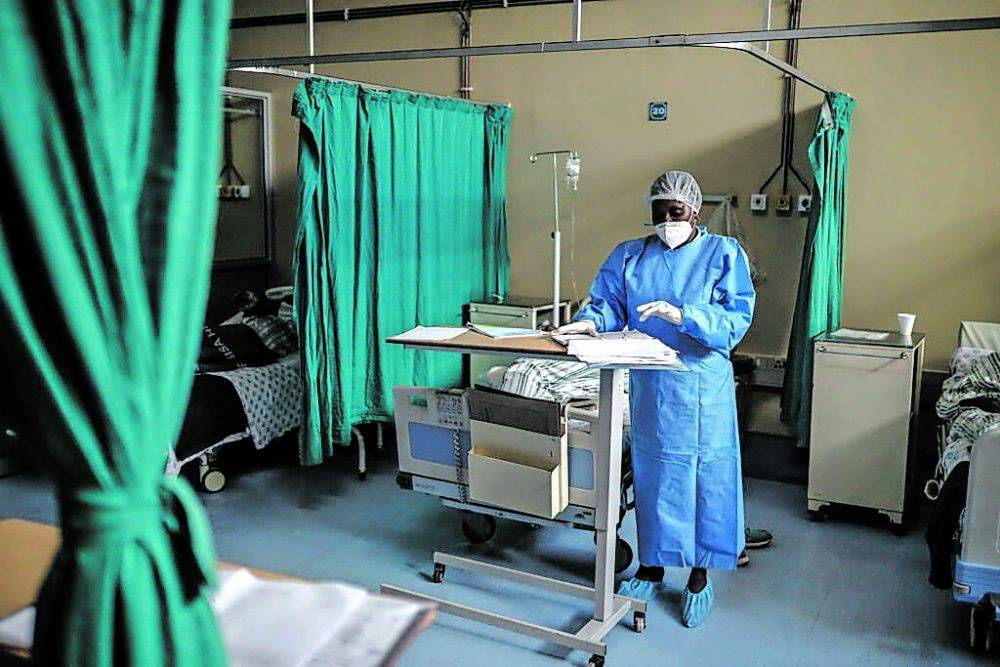
Hospital plan: It’s a middle class emergency. Photo: Guillem Sartorio/AFP
Aside from some snobby Brits and sundry hard-line communists, being a member of the middle class is considered to be a good thing. A better education leads to better jobs with higher salaries and what it is really all about: spending power.
And in South Africa, where so many were for so long denied the chance to become members of the middle class, this is often trumpeted as a sign of what the government has done for previously disadvantaged people.
Being upwardly mobile means you can afford the monthly instalments on that flashy car you have always lusted after, that exorbitantly priced pair of sneakers can go on the credit card and a visit to the upmarket grocery store becomes a pleasure, not a pain. No more generic wors bought at one of those unpleasantly overstocked cut-price meat emporiums. Only prizewinning boerewors will be sizzling on your shiny new Weber.
The slightly older and maybe wiser middle-class members can buy a house, or more likely a unit in one of Joburg’s endless complexes. The brats can be sent to “better” schools that charge outrageous fees and the ungrateful youths can be enrolled at universities (no NSFAS for you, the “missing middle”) .
Newfound financial stability means the car and household insurance can be paid, the security company too and the electricity, water, rates and taxes. The more mindful will also invest in a pension fund or retirement annuity. Ageing parents can be looked after and there might even be some money for those layabout cousins and the uncle who is overly fond of Black Label quarts.
In a country with a thriving economy, this is all manageable. But, when there is growing unemployment and the gap between salaries and the cost of living widens, then we become ensnared in what the more cynical among us call the “middle class trap”.
Money has to be found for all those stop orders that whack off your account at the end of the month. There is a desperate search for ways to economise. Ditch the DStv subscription (there is not much to watch, but how will you watch the football?) You can mow your own lawn, sweep your own driveway, wash your own car, iron your own clothes, mop the kitchen floor and eat rice and beans instead of steak and chips.
But never, ever can you get rid of the medical aid. Because, without a medical aid — or, more likely, a hospital plan if you are a member of the middle class — then you will have to join the masses and throw yourself on the mercy of the much-maligned public health system.
And notwithstanding the acrimonious debate about the National Health Insurance, once you have been able to call up and make an appointment with the doctor of your choice, or been admitted to a private hospital, the thought of a visit to a public hospital is sickening.
For many years of my misspent youth, which extended into my thirties, I was oblivious to the need for medical aid. It was sheer good fortune that when a real medical emergency arose, I had just been persuaded to start coughing up the monthly chunk of medical aid money.
A nasty little lump that had been steadily growing on my eyelid was diagnosed as potentially cancerous and had to be removed. My doctor referred me to his pal, the plastic surgeon. When I arrived for my appointment I was greeted by waiting room chairs all occupied by women and a shelf with a display of silicone-enhanced breasts in all shapes and sizes.
It was obvious where the money came from to pay for the plush new leather covering for his car seats that the doc was discussing on the phone when I was shown into his office. But he was a skilled surgeon and with the help of some skin taken from behind my ear he restored the beauty of my eyelid.
His staff were equally adept at administration and ensured that the medical aid company paid all the bills. I had been worried about this because, of course, I only had a hospital plan and my limited intellect and short attention span made it impossible to wade through the “small print” that the companies like to use to avoid payment. I do know that visits to the optometrist are not covered, so no chance of specs to help decipher the small print.
Years later and with three medical aid members to pay for, I still don’t really know what the policy covers. It is only when something happens that this is revealed.
A few years ago I answered my phone and the first words I heard were, “I think I have slit my wrist.” Coward that I am, it was a relief to learn that it was not something that I had said, it was the serrated edge on the lid of tin can lurking in the rubbish bin that had caused the damage to my dearly beloved’s arm.
I was on the opposite side of town but a brother was available to rush her to the emergency room at the hospital. When I arrived she was having the wound cleaned after the bleeding had been stopped. I was detained at reception to fill out many forms and to hand over my credit card. Only then could the stitching begin. Because the injured party was not admitted to hospital, the medical aid would not pay anything.
These are mere skirmishes on the South African healthcare battlefield that is often, literally, littered with bodies. And there are many people with harrowing tales to tell.
But, as we cling on to our hard-earned perch among the middle classes, we have to keep in mind that there are millions of South Africans who are simply grateful that there is now a clinic within walking distance of their home.



